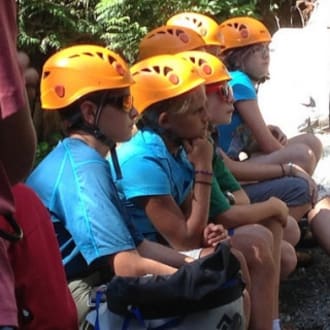
It is a tall order to claim that one is equipping and inspiring students to cultivate their humanity. What would that look like? And what, in particular, would it look like in the context of working with sixty or so adolescents at a small middle school on Bowen Island?
The first thing to understand is that we can only offer—at a middle school level—what might be thought of as a primer coat to a complete education … or, perhaps better, a base coat that goes on after the “primer coat” of a well-founded elementary education. In the world of industrial painting a primer coat is the layer that one puts on first to ensure that subsequent layers properly adhere. The base coat goes on second, while the finishing coat comes last.
If we think of elementary education as the primer coat, middle school education as the base coat, and senior secondary schooling as the finishing coat, then we will have a picture of how the various layers might be understood to contribute to a whole. The “primer coat” layer of education is essentially about giving students a rock-solid learning foundation. The “base coat” layer, on the other hand, needs to shift the emphasis to (guided) exploration, while the “finishing coat” layer must focus on consolidation.
Assuming that the primer coat of a well-founded elementary education is already in place, what exactly might this guided exploration in the middle years encompass?
First, it needs to be the kind of education that will sustain and enhance intellectual curiosity within young people. It is precisely in the middle years that adolescent students can lose their spirit of inquiry, replacing it instead with a kind of feigned indifference to anything of substance. If this occurs, then the fault is partially ours, for the feigned indifference of adolescents might simply be their inarticulate expression of the fact that we have not really challenged them intellectually. What adolescents desperately need at this point in their lives is to learn is a higher orderof inquiry beyond the natural curiosity that may have propelled them through their elementary years. They need, in short, to learn how to ask intelligent questions.
This turns out to be more difficult than it might first appear, for it requires both the acquisition of particular skills and the cultivation of a certain sensibility. It is the easiest thing in the world to encourage students to “ask questions”; it is much more difficult to show them how to ask intelligent questions. University educator Martha Nussbaum has appropriately warned us that in the pursuit of so-called “critical thinking”, we need to be sure that we do not create a generation of students who are “insolent without being wise.” It is for this reason that the Practical Reasoning and Senior Seminar courses at Island Pacific School are meant not only to teach basic skills in argument analysis, but more importantly to cultivate a capacity and sensibility in students to ask the kinds of questions that will yield a deeper understanding of the problem. This emphasis on critical inquiry is also meant to form one element of the instructional approach across all subject matter, and it culminates in the grade nine Masterworks requirement.
The second key aim within the guided exploration of the middle years is to arrange the school experience so students become introduced (or re-introduced) to the idea of personal and moral responsibility. A number of elements are built into the school that are meant to bring this into focus: the clean-up crews, the outdoor pursuits trips, the community service opportunities, the (new) grade nine assemblies, and even the way that “discipline” is handled at the school. All of these are both object lessons and explicit invitations to express “the very best of what it is to be a human being”. The adults within schools need to be intentional about creating these object lessons and making these invitations. To fail to do so is to abdicate one’s responsibility to educate in any meaningful sense.
In the most general terms, then, what we need to do through the guided exploration of the middle years is teach our children how to ask intelligent questions and cultivate within them a strong sense of personal and moral responsibility.
I believe that the stakes are high when it comes to middle school education. If we do it right, we can set kids up for the rest of their lives; if we do it wrong, we can, at the very least, waste their time and, at the most, do real damage. You may be interested to know that I started Island Pacific School partially out of frustration at my own schooling. It wasn’t until graduate school that I got my first glimpse of the power and magnitude of human inquiry and, having caught that glimpse, that I realized how thoroughly robbed I had been when it came to my own grade-school education.
I know from experience that middle school students have both the capacity and inclination to deepen and enrich their understanding of the world and themselves, if given the right context. The whole point of Island Pacific School, of course, is to provide that context.